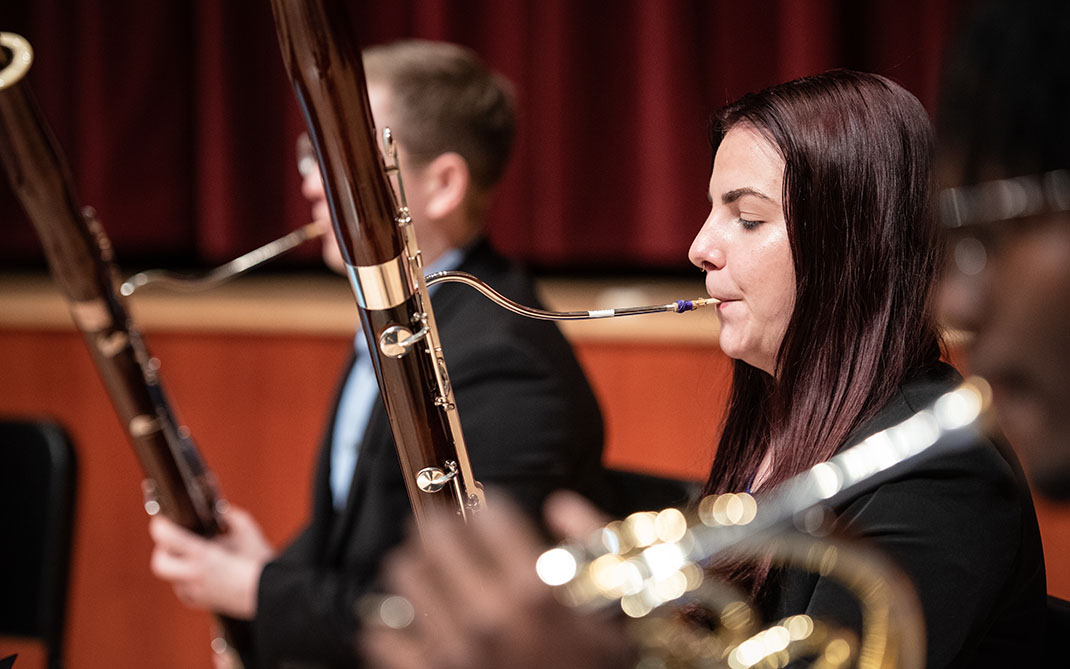Mentoring a new generation of filmmakers
Eric Johnson grew up in Winston-Salem, not far from the University of North Carolina School of the Arts. But he knew little about the renowned arts conservatory until much later in life.
Looking back on it now, Johnson wishes someone had exposed him to the arts school when he was young enough to take advantage of the myriad opportunities offered there. That’s one reason why he now volunteers as a mentor for teenagers from the Full Frame School of Doc who are attending the UNCSA Summer Filmmaking Intensive.
“One of my key roles is helping them become aware of the many, many jobs available in the film and content-creation world,” says Johnson, the vice president of sound and engagement for Trailblazer Studios in Raleigh. “I had no idea that this career existed when I was in high school, let alone college.”
Thanks to a partnership between the Thomas S. Kenan Institute for the Arts at UNCSA and Full Frame Documentary Film Festival in Durham – now in its second year – Dorian Gomez and Irena Daniels were able to spend five weeks this summer living on campus and exploring the types of opportunities in filmmaking that Johnson referenced.
“They are receiving an experience that many college students either don’t ever get or don’t get until the very end of their college career,” says Johnson, who serves on Full Frame’s Triangle Advisory Board.
“It is just such a rare opportunity and gives them a leg-up on everything going into college. I wish I had had an awareness of the range of careers within the film industry when I was a teenager. I see myself in these students.”
Johnson first met Dorian and Irena a year ago at Full Frame’s School of Doc, a free program that exposes students in Durham to all aspects of documentary filmmaking. This summer, as their mentor during the Filmmaking Intensive, he was only a phone call or short drive away.
The girls seemed to do just fine on their own, however. Dorian, a 19-year-old native of Mexico whose family immigrated to Durham when she was young, is a rising sophomore at Durham Technical Community College. Irena, 18, graduated from C.E. Jordan High School in Durham last May and recently began her studies at Allegany College of Maryland, also a community college.
Both are interested in filmmaking, albeit varying aspects of the craft.
A high school film class piqued Dorian’s interest in editing. Then one day she took a wrong turn down a school hallway — or, perhaps, it was the right turn, she notes —and happened upon a flyer advertising the School of Doc.
“I thought, hmmm, this is interesting. At this point I was a senior and I was pretty frustrated with everything,” she recalls. “Everybody was already making their decisions about life and college, and I still didn’t know what I wanted to do. For my parents, paying for college would be tough.”
Always supportive, Dorian’s parents encouraged her to follow her gut instinct and apply. “I did the program last summer and I had a blast,” says Dorian, a natural who caught the eye of a teacher at the School of Doc and was invited to continue working with him on film projects after the program ended.
Irena, whose mother died during childbirth, moved from Queens to Durham at age 3 and was raised by an older sister. A high school creative writing class helped her overcome shyness. “I felt through writing I could get a lot of my emotions out,” she says. “I could say a lot of things to my classmates through writing.”
A school counselor recommended the School of Doc program to Irena. Her first thought: “I don’t like documentaries because they talk about depressing stuff.”
But that changed quickly. “Literally on the first day, I enjoyed the positive energy going on,” she recalls. “During the final project, I thought maybe this was something I would like to do for a living — doing interviews behind the camera or telling stories in front of the camera. It was unexpected.”
At UNCSA this summer, the teens delved into the process of narrative filmmaking, from screenwriting and cinematography to directing, producing and editing.
Dean of Filmmaking Susan Ruskin calls the experience “intense and eye-opening” for most students.
“We are taking them from a doc program and introducing them to the narrative process, with a heavy emphasis on story development, which is the key to a successful short film in the end,” Ruskin says.
“They see the entire pipeline of making a film. These students are put through in a few weeks what we put our students through in a full year. … Anyone who comes through this experience cannot help but have their eyes opened and changed by it.”
After her summer experience, Dorian would like nothing more than to transfer to UNCSA when she finishes her associate’s degree. As for Irena, she plans to study multimedia in college and possibly pursue a career in broadcast journalism.
A goal of this partnership between the Kenan Institute and Full Frame, part of the Kenan Institute’s Career Pathways Initiative to broaden opportunities for sustainable careers in the arts, is to provide School of Doc students with the opportunity to explore the four-year film study degree program at UNCSA and, in turn, contribute to the diversification of the film industry.
Johnson believes diversity in the workforce can be achieved if talent is identified and targeted early.
“The Kenan Institute program opens this world up to students from different racial and socio-economic backgrounds who may have never considered this as a field of study in school,” he says.
“You’ve heard the criticism about the Oscars. The place to fix that is to start with students young enough to direct, and increase the number of diverse students in the pipeline approaching the industry. We have to raise a new generation of filmmakers who are from different backgrounds and it needs to start at the high-school level.”
October 05, 2017





